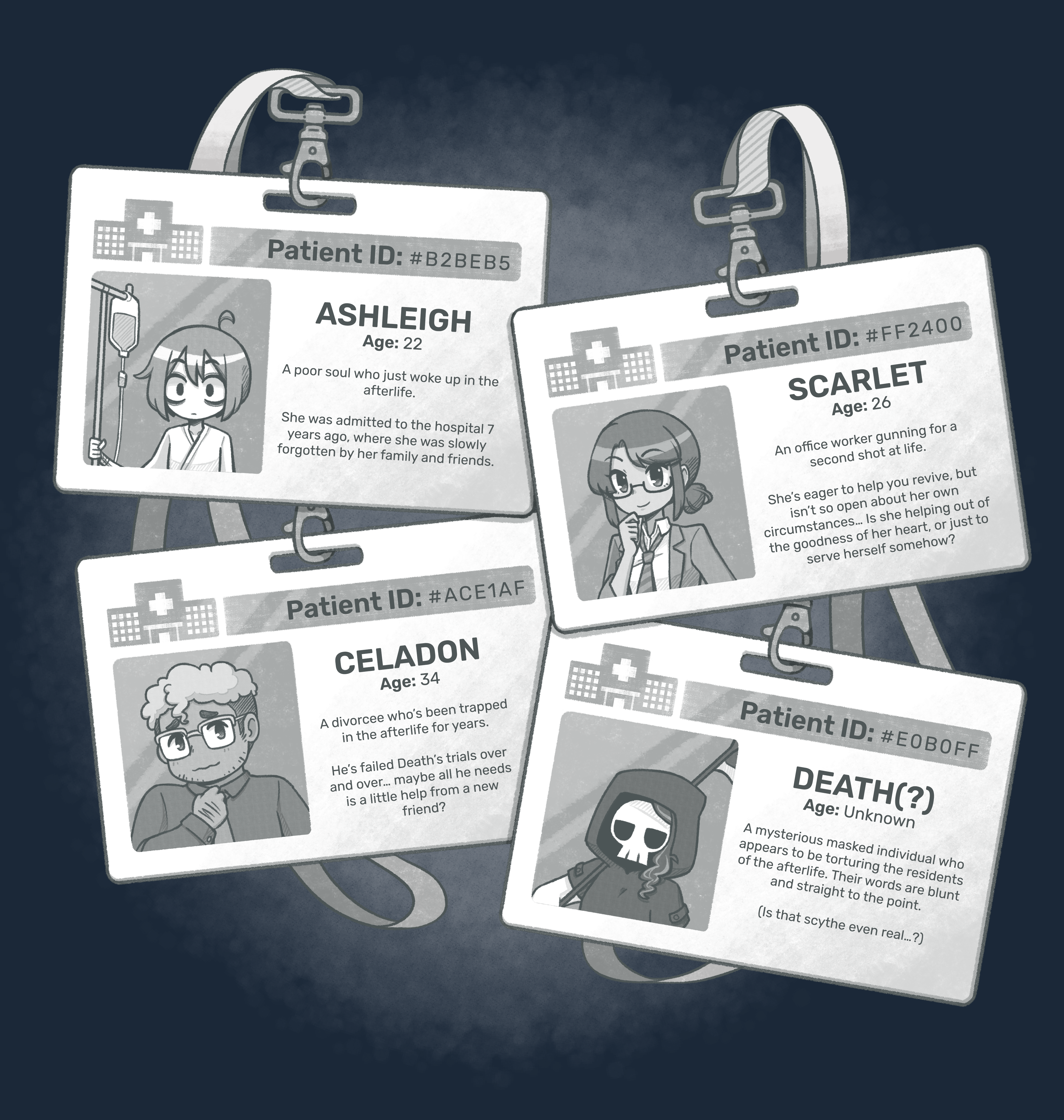What if the afterlife were a hospital? Not heaven. Not hell. Just white corridors, sterile silence, and a strange sense of calm. Return to Ash, the newest visual novel from Serenity Forge, starts with that simple but eerie question—and spins it into a delicate story about loneliness, regret, and the aching hope for one more chance.
This short but potent narrative experience blends light decision-making, emotional storytelling, and minimalist art into a tidy 2-4 hour package. It may not be groundbreaking in terms of mechanics, but its execution is quietly profound. For fans of reflective visual novels like Spiritfarer or To The Moon, Return to Ash offers a bittersweet, slow-burning journey that resonates.

Death Is Only the Beginning
You wake up in a hospital. Empty, bright, and oddly serene. You play as Ashleigh—a woman who finds herself in a purgatory-like afterlife with no clue how she got there. Her aches and illnesses are gone. So is everything she knew. Beyond the window? A white void.
Ash isn’t alone for long. Others inhabit this strange place, each wrestling with their own unfinished stories and ghosts. Soon enough, a figure calling themselves “Death” enters the picture, offering trials that may determine whether these lost souls can return to the land of the living—or fade away.
It’s a setup that feels intimate and immediate. And while the concept of limbo has been explored plenty in games and fiction, Return to Ash makes it feel new by narrowing the lens. This is less about theological judgment and more about human connection.
Soft Lines, Hard Emotions
Visually, Return to Ash is deceptively simple. It uses soft, monochrome backgrounds and clean character sprites to evoke a kind of cozy melancholy. Think Undertale meets sketchbook doodles—not flashy, but deeply expressive.
The visual direction works. The emptiness of the hospital feels intentional, allowing each character’s design and personality to stand out. There’s just enough detail to keep you grounded, and just enough blank space to make the whole world feel dreamlike.
Complementing the art is a lovely, understated soundtrack. The score ranges from calm and meditative to quietly devastating, hitting emotional beats without overwhelming the story. It’s the kind of soundtrack you might want to leave on after the game ends.

Decisions, Dialogue, and Development
As a visual novel, Return to Ash sticks to genre basics. You read, you choose, and your choices shape how relationships and the story unfold. While not a gameplay-heavy experience, the branching narrative and multiple endings encourage replays.
Each choice you make subtly nudges Ashleigh’s story down a different path. Some playthroughs are more hopeful. Others, more final. There are no right or wrong answers, but the sense of consequence is real, which is impressive given the game’s brief runtime.
A full run takes around two hours, though completionists may spend longer chasing alternate endings or uncovering hidden dialogue routes. One notable aspect is how well the different endings tie back into the game’s emotional core. Even small decisions carry surprising weight.
Quiet and Relatable
Ashleigh is a refreshing protagonist. She’s not a blank slate or over-the-top anime archetype. She’s vulnerable, introspective, and relatable. Her grief, guilt, and uncertainty feel human. And the other characters she meets? Equally compelling.
Whether it’s the stoic Scarlet, the enigmatic Death, or a fellow soul lost in their own regrets, each character you meet is written with care. Their arcs are short but sincere, packed with quiet moments of levity, warmth, and heartbreak.
The writing strikes a delicate tone—often sad, sometimes sweet, occasionally funny. It’s not trying to shock or sensationalize. It’s simply honest. And that honesty lands.

What Works:
- Thoughtful Storytelling: The central themes of loss, regret, and connection are handled with sensitivity and nuance.
- Short but Meaningful: The 2-4 hour runtime ensures every scene matters. No filler.
- Art and Music: A soothing aesthetic and a memorable score elevate the emotional impact.
- Multiple Endings: Gives players a reason to replay and dig deeper into the narrative.
What Could Be Improved:
- Pacing Toward the End: Some players may feel the final act wraps up too quickly.
- Minimal Gameplay: If you’re looking for puzzles, action, or mechanics, this isn’t your game.
- UI/Text Speed Options: A few players noted wanting better control over text speed or scene transitions.
Return to Ash: Return to Ash is a quiet triumph. It’s not flashy. It doesn’t demand much of your time. But it leaves a mark. Like waking from a vivid dream, you’ll carry bits of it with you. Maybe it’s a line of dialogue. Maybe it’s the moment you chose kindness. Maybe it’s just that soft feeling of being seen. Serenity Forge has delivered something beautifully self-contained. For anyone in need of a reflective, emotionally resonant visual novel, Return to Ash is worth the journey. – Obsidian


